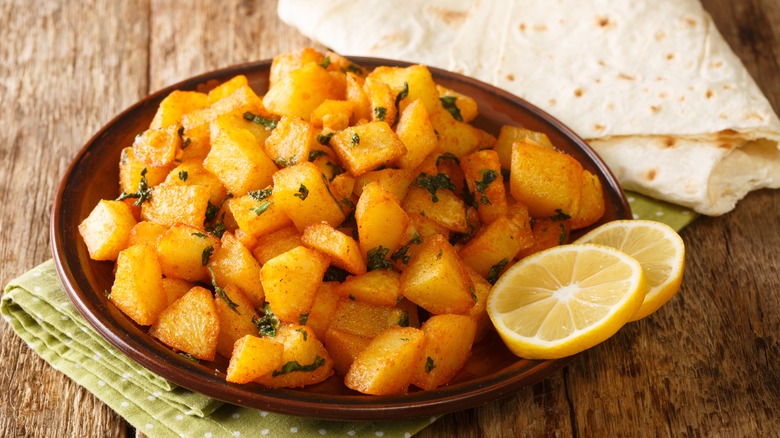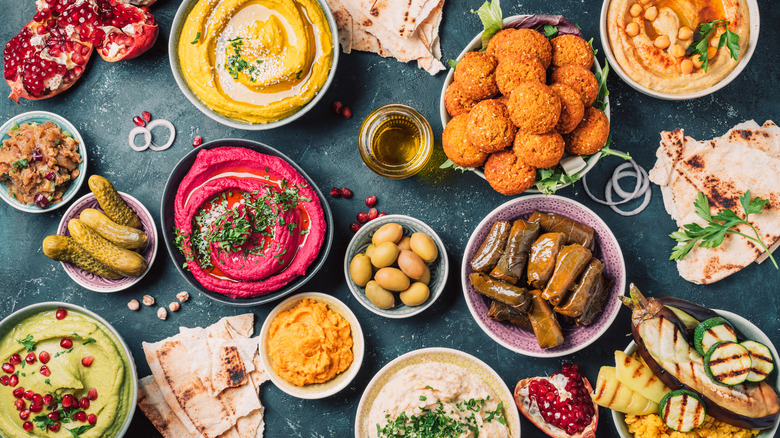Batata Harra Is The Spicy Lebanese Potato Dish You Should Know
Potatoes are a staple all over the world, and they're just as good fried as they are baked, roasted, or mashed. From France to Korea, you'll find potatoes prepared in countless different ways. If you're in Lebanon, specifically, you're likely to come across something really special: batata harra. The dish is made from cubed potatoes that have been tossed in ground coriander, red chilies, and garlic. Fried in a pan with olive oil until fragrant and crispy, then sprinkled with fresh cilantro before they're served, these potatoes have a Middle Eastern flare that will have you putting your basic breakfast potatoes on the back burner.
Translating to "spicy potatoes," this potato dish is known to pack the heat whether through frying fresh red chilies or crushed red pepper flakes and garlic along with the potatoes. Not only are they spicy but they're often double-fried, which means that they won't disappoint on the crispiness factor. For the more health-conscious, however, batata harra is equally as tasty when it's baked until golden. All of that can be attributed to the fresh, flavorful ingredients the potatoes are tossed with. From the chilies to the garlic, and from the fresh cilantro garnish to the finishing squeeze of lemon, if there's one thing these potatoes never lack, it's flavor.
The history of this spicy Lebanese potato dish
If you're particularly well-versed in the potatoes of the world, you may recognize the word "batata." The word — and other dialects versions of it — is used in a number of popular potato dishes: patatas bravas, batatas majadas, and batatas a murro to name just a few. The reason the word "batata" shows up in the names of so many of these potato dishes is because it's the Portuguese word for "potato." Portugal was the one of first European countries that was introduced to the root vegetable in the 1700s, when Spanish conquistadors brought them back from Peru. Portugal then brought them to Lebanon where, despite Arabic being the common language, the word "batata" stuck.
"Harra," on the other hand, translates to the word used to describe something that is spicy and hot in Arabic. The name combines a Portuguese and Arabic word to translate literally to "spicy potatoes" in a combination of languages that is indicative of the dish's multi-cultural history. Still, when it comes down to how batata harra is served, that can only be credited to the Mediterranean and Middle East. Batata harra is particularly popular when served as part of a mezze, a traditional style of eating in the Mediterranean and Middle East where small, sharable plates are spread out in courses similar to tapas, except the mezze makes up the entire meal.
How to enjoy batata harra
Although mezze is entirely customizable, it's typically served in two courses. The first involves all of the cold plates, and the second features all of the hot plates. So, following all of the hummus, zaalouk, tabouleh, fattoush salad, and the likes that are served first, the fan-favorite batata harra arrives second. It will be accompanied by other hot mezze platters like fried eggplant, sambousek, and kofta, too.
Tradition can be great, and if it's important to you, you should follow it, but batatas harras don't have to be strictly served in a mezze setting by any means. In fact, their crispy texture and spicy flavor sound pretty ideal for breakfast. Substituted for your basic hash and served with a nicely fried egg on top, batatas harra is the perfect way to switch up your morning routine. Just like any other potato dish, they also work especially well as a side if served with a grilled protein, soup, stew, or even a salad. Also, in true mezze fashion, they're a great dish to prepare when you're hosting. Just be sure to make extra, because no matter who you are, no one can resist crispy potatoes, and these are sure to go quickly.


